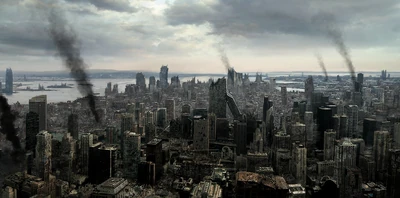The aftermath is the common name for a period of time after a zombie outbreak has ended. Characteristics of an aftermath scenario include rebuilding cities, establishing governments, creating new social structures, and reviving culture, and generally restoring life to a pre-apocalypse state.
Immediate Aftermath[]

Large cities are often left in ruins during the aftermath.
The state of the world during the aftermath is largely based on the events that occurred during the apocalypse. Depending on the environment and what transpired during the infection, the world after will differ. It will most likely be war-torn and devastated, and history will be changed greatly. Large cities will now be in ruins with dead bodies littering the street. However, if it was a small outbreak (one that only affected a few cities, counties, provinces, villages, towns or a state), it is possible to restore life to usual. Worldwide outbreaks, though, have less chance of salvation.
Aftermath Government and Power[]
The world will, of course, be altered after a large-scale outbreak, but the fate of the earth will largely depend on how intact the governments are when the outbreak is fully ended. There are two ways this can end based on the amount of action taken during the apocalypse (assuming that the living won):
Situation 1: Government Restores Order[]
If the government of a nation acts quickly enough and manages to pull together to protect its citizens during the outbreak, it is likely that society will not change much in the aftermath. Large areas called safe zones or refugee camps will house survivors until the military can clear dangerous areas. However, this kind of scenario enables the government and military to have extraordinary power. This can lead to extreme oppression. It can also cause safe zones to be left unprotected, allowing bandits to harass the citizens and/or take control.
Situation 2: Citizens Inherit the Earth[]
In such a scenario, the outbreak has caused all levels of organized government to collapse, except for the roving military squads and survivor groups who have formed a sort of government. This scenario can prove to be just as dangerous as the first. This is due to the fact that the power is up for grabs for essentially anyone - a scenario similar to medieval times. Roving groups of barbarians (in this case, bandits) pillage the land, so the peasants (survivors) gather together in large fortified castles (bases) for mutual protection. Over time, these bases may grow into small towns, and each town may be different, and may even squabble over resources. Some may band together for protection.
With the collapse of traditional organizational structures, people are free to make their own rules. Whether established in a secure location or moving as nomads, order and rules are made on a whim and will not be opposed unless someone is strong enough to stand against them. After zombies cease being a threat, it would be much safer to venture out of bases. This can lead to power grabs of locations and resources now that much land is unoccupied. With old world borders erased, those that are left are free to draw their own. Expansion of settlements to control more land would most be hindered by population levels needed to occupy, sustain, and defend a new one. This may lead to the growth of city-states that expand but stay in one location for protection from dangerous outsiders. National identity could still prevail through people inside a previous country, making it easier to work together and even self-proclaiming its continuation through them.
Problems[]
While reconstructing society is ideal there are still problems with the aftermath
- Group leaders still love the idea of being in power and will do anything to stay in power.
- There must be enough people in the world to repopulate the planet and if there isn't then humanity will be extinct within the year or the next year.
- Another problem is how survivors can live with each other.
- The final problem with reconstruction is that humanity may never go back to the way it was before the apocalypse as the military officials, government officials and scientists will either be all killed in the first few days or have a very small amount of officials to restart networks, rebuild beneficial scientific inventions, communications with other countries, etc. The society will have limited resources than the way it was before and it will cause problems if the survivors need to know that they are only survivors in the world because of the event.
